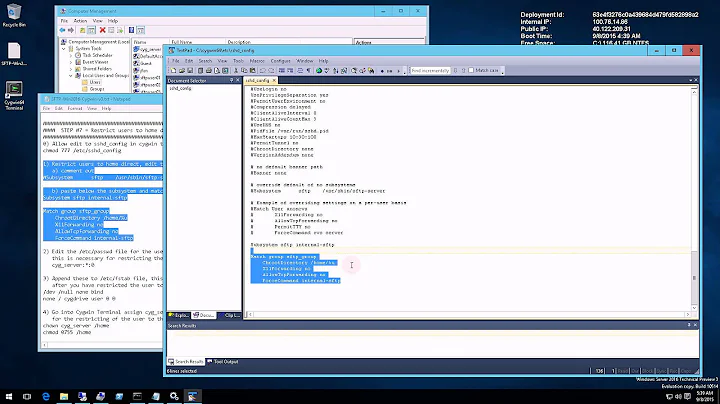authorized_keys for multiple chrooted users with the same home directory
One option is to use tokens to give each user a unique authorized_keys file.
From man sshd_config:
AuthorizedKeysFileSpecifies the file that contains the public keys that can be used for user authentication. The format is described in the AUTHORIZED_KEYS FILE FORMAT section of
sshd(8).AuthorizedKeysFilemay contain tokens of the form%Twhich are substituted during connection setup. The following tokens are defined:%%is replaced by a literal%,%his replaced by the home directory of the user being authenticated, and%uis replaced by the username of that user. After expansion,AuthorizedKeysFileis taken to be an absolute path or one relative to the user's home directory. Multiple files may be listed, separated by whitespace. Alternately this option may be set tononeto skip checking for user keys in files. The default is.ssh/authorized_keys .ssh/authorized_keys2.
Emphasis mine.
So you can set:
AuthorizedKeysFile .ssh/%u_authorized_keys
Then for user foo create an authorized_keys file .ssh/foo_authorized_keys.
A note on permissions
From man sshd:
~/.ssh/authorized_keys
...
If this file, the~/.sshdirectory, or the user's home directory are writable by other users, then the file could be modified or replaced by unauthorized users. In this case, sshd will not allow it to be used unless theStrictModesoption has been set tono.
So you may need to stick your keys outside .ssh/, or else set StrictModes to no. If you set StrictModes to no make sure another user can't create an authorized_keys for someone else, or delete the other user's authorized keys. Probably best off doing something like:
AuthorizedKeysFile .ssh_%u/authorized_keys
Create a directory .ssh_foo/ for user foo, that only foo can read/write.
You can choose if you want to also allow .ssh/authorized_keys by using
AuthorizedKeysFile .ssh/authorized_keys .ssh_%u/authorized_keys
This will allow the "normal" form of authorized_keys to still work, and an authorized_keys file must be owned by your user and have correct permissions or it will be ignored. Still consider that it should not be possible to create an authorized_keys file for another user, which could just mean touching the file as root so it's empty.
Related videos on Youtube
Radek Stašek
Updated on September 18, 2022Comments
-
Radek Stašek over 1 year
We are running CentOS 6.9 with OpenSSH_5.3p1 and created chrooted accounts for external users with the same home directory (mounted to htdocs). Problem is that the file
.ssh/authorized_keys2is owned by the first user (and this works already). How can I make it work for another user?I tried to add an
AuthorizedKeysFilein sshd_config with multiple file paths and I got the errorgarbage at end of line.I tried to add an
AuthorizedKeysFileinsshd_configin the match block of the second user and I got the error'AuthorizedKeysFile' is not allowed within a Match block.I cannot change the home directory because otherwise the path is different from the real path for development.
Any suggestions how to solve it? May I have to upgrade OpenSSH to a newer version that supports multiple entries for
AuthorizedKeysFile(I think I have to build it with rpm)? What about security updates afterwards?-
Centimane almost 7 yearsDefine "make it work". What action are you trying to take that's failing? I assume you're trying to SSH without a password to many different accounts using the same home directory? Is it that you're having trouble giving each user a unique
authorized_keysfile given that they share a home-dir?
-
-
Radek Stašek almost 7 yearsThanks a lot. I solved it with "AuthorizedKeysFile .ssh_%u/authorized_keys2", because the directory needs ownership of the user, too. As mentioned in my question it was not possible to declare more than one file with my openssh version (I think support was added in release 5.9). I had to create this user specific .ssh-directory for all existing non-chrooted users, too.
-
Centimane almost 7 years@hellcode I figured to put the note of it: 1. just in case your syntax was wrong and 2. In case of other people with the same question where multiple files is allowed. Good to hear it solved it for you anyhow.







